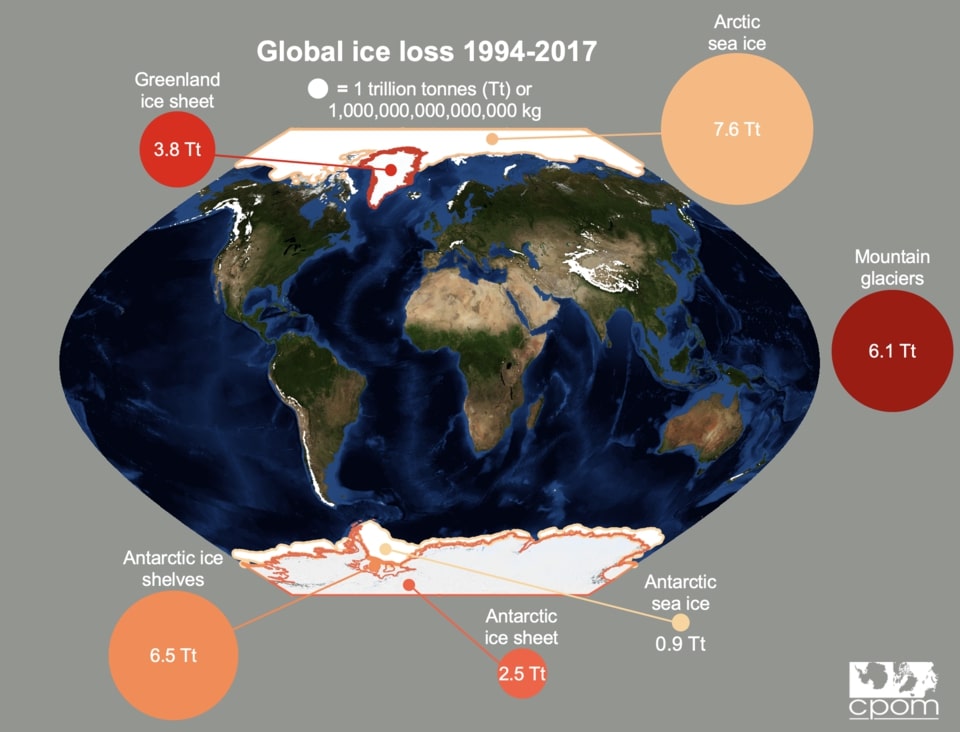According to a new study, global ice melt has accelerated so much over the past 30 years that it’s now in line with the worst-case climate warming scenarios.
—
What is Happening?
- The research paper, published in the journal The Cryosphere, says that a total of 28 trillion metric tons of ice was lost between 1994 and 2017, in what is the first global ice-loss survey using satellite data. Overall, this is a 65% increase in the rate of ice loss over the 23-year survey, which has been driven mainly by steep rises in losses from the polar ice sheets in Antarctica and Greenland. Visually, this is the equivalent of a 100 metre thick sheet of ice able to cover the whole of the UK. The research used information from the European Space Agency’s network of satellites.
- During the survey period, there was a loss of 8.3 trillion tons of Arctic sea ice and a loss of 7.1 trillion tons from Antarctic ice shelves, both of which float on the Polar oceans.
- In just 2017, the Earth lost 1.3 trillion tons of ice, accelerating from 0.8 trillion tons per year in the 1990s.Half of all losses were from ice on land.
- The increase in ice loss has been triggered by warming of the atmosphere and oceans, which has warmed by 0.26°C and 0.12°C per decade since 1980, respectively.
- The survey analysed 215 000 mountain glaciers spread around the world, the polar ice sheets in Greenland and Antarctica, the ice sheets floating around Antarctica and sea ice drifting in the Arctic and Southern Oceans. These losses have raised global sea levels by an estimated 35mm.
You might also like: Water is Now Being Traded as a Commodity Amid Fear of Scarcity

Global ice loss 1994–2017 (Source: Slater et. al, 2021)

Ice lost between 1994–2017 (Source: Slater et. al, 2021)
In a statement, lead author Thomas Slater said, “The ice sheets are now following the worst-case climate warming scenarios set out by the Intergovernmental Panel on Climate Change. Although every region we studied lost ice, losses from the Antarctic and Greenland ice sheets have accelerated the most.”
- Ice melt from sheets and glaciers contributes to global warming and indirectly influences sea level rise, which increases the risk of flooding in coastal communities.
- Earth’s northern and southern poles are warming more than twice as fast as the rest of the planet. In 2020, Arctic sea ice extent hovered around the lowest ever for most of the year.
Isobel Lawrence, a researcher at the Leeds’ Centre for Polar Observation and Modelling, says, “One of the key roles of Arctic sea ice is to reflect solar radiation back into space, which helps keep the Arctic cool. As the sea ice shrinks, more solar energy is being absorbed by the oceans and atmosphere, causing the Arctic to warm faster than anywhere else on the planet.”
- It is estimated that for every centimetre of sea-level rise, approximately one million people in low-lying regions are in danger of being displaced.
- Despite storing only 1% of Earth’s total ice volume, glaciers have contributed to almost a quarter of the global ice losses over the study period, with all glacier regions around the world losing ice.
- As well as contributing to global mean sea-level rise, mountain glaciers are also critical as a freshwater resource for local communities.

















